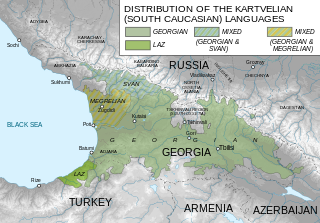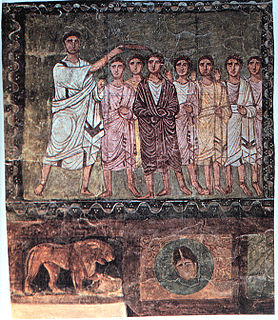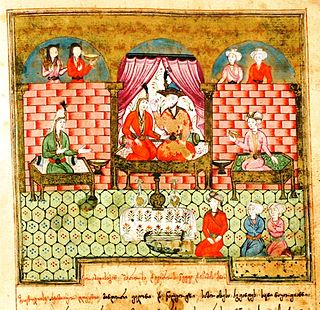Ioane Shavteli (Georgian :იოანე შავთელი) was a Georgian poet of the late 12th and early 13th centuries credited to have written the encomiastic poem traditionally, and unsuitably, known as Abdulmesiani (აბდულმესიანი), i.e., "Slave of the Messiah" (from Arabic عبد المسيح, Abdul Masīh).

Georgian is a Kartvelian language spoken by Georgians. It is the official language of Georgia. Georgian is written in its own writing system, the Georgian script. Georgian is the literary language for all regional subgroups of Georgians, including those who speak other Kartvelian languages: Svans, Mingrelians and the Laz.

Georgia is a country in the Caucasus region of Eurasia. Located at the crossroads of Western Asia and Eastern Europe, it is bounded to the west by the Black Sea, to the north by Russia, to the south by Turkey and Armenia, and to the southeast by Azerbaijan. The capital and largest city is Tbilisi. Georgia covers a territory of 69,700 square kilometres (26,911 sq mi), and its 2017 population is about 3.718 million. Georgia is a unitary semi-presidential republic, with the government elected through a representative democracy.

In Abrahamic religions, a messiah or messias is a saviour or liberator of a group of people.
A reference to Shavteli and his work is made in a postscript of Shota Rustaveli’s The Knight in the Panther's Skin (ვეფხისტყაოსანი), which is the source of the poem's incongruous title. Shavteli's ode is, in fact, a eulogy to the two greatest monarchs of medieval Georgia, David "the Builder" (r. 1089-1125) and the poet's contemporary Queen Tamar (r. 1184-1213). Little is known about the author’s biography himself. "Shavteli" seems to be a territorial epithet, meaning "of/from Shavsheti" (modern Şavşat, Turkey). Shavteli's style includes a strong patristic discourse and his language is to a considerable extent artificial and archaically bookish. Possibly a cleric, he is reported by the medieval chronicles to have been a famous poet and philosopher and to have accompanied Tamar in several of her travels and military campaigns. [1]

Shota Rustaveli, mononymously known simply as Rustaveli, was a medieval Georgian poet. He is considered to be the preeminent poet of the Georgian Golden Age and one of the greatest contributors to Georgian literature. Rustaveli is the author of The Knight in the Panther's Skin, which is considered to be a Georgian national epic poem.

The Knight in the Panther's Skin is a Georgian medieval epic poem, written in the 12th century by Georgia's national poet Shota Rustaveli. A definitive work of the Georgian Golden Age, the poem consists of over 1600 Rustavelian Quatrains and is considered to be a "masterpiece of the Georgian literature". Until the early 20th century, a copy of this poem was part of the dowry of any bride.

David IV, also known as David the Builder, of the Bagrationi dynasty, was a king of Georgia from 1089 until his death in 1125.
Shavteli's panegyric focuses on praising the Christian virtues of David and Tamar, without naming either however. The references to Tamar are coded by praise of her beauty, her love of "doing good by stealth", also praised in similar phrases by the queen's chronicler as well as by the two contemporary poets - Rustaveli and Chakhrukhadze. David can be recognized by allusions to his biblical namesake (from whom the Georgian dynasty of Bagrationi claimed descent) as well as by interweaving words and phrases from the king’s own religious lyrics, the Hymns of Penitence (გალობანი სინანულისანი). [2]
Chakhrukhadze is a Georgian poet of the late 12th/early 13th century traditionally credited to have written Tamariani (თამარიანი), a collection of twenty two odes and one elegy praising, often deifying Queen Tamar of Georgia. The poet is identified with the certain layman Grigol Chakhrukhadze whose survived testament unveils the author's desire to retire to the Georgian Monastery of the Holy Cross at Jerusalem. According to later accounts, Chakhurkhadze was native to Georgia's northeastern mountainous area of Khevi and served as a secretary to the queen Tamar.

The Bible is a collection of sacred texts or scriptures. Varying parts of the Bible are considered to be a product of divine inspiration and a record of the relationship between God and humans by Christians, Jews, Samaritans, and Rastafarians.
A legend that the Georgian royal Bagrationi dynasty were of a Hebrew origin and descended from David dates back to the family's appearance on the Georgian soil in the latter half of the eight century. As the Bagratid power grew, this claim morphed into an officially endorsed paradigm, enshrined in medieval historical literature such as the early 11th-century chronicle of Sumbat Davitis-dze, and formed the basis of the dynasty's political ideology for the duration of their millennium-long ascendancy in Georgia. The proposed Davidic descent allowed the Bagrationi to claim kinship with Jesus Christ and the Virgin Mary and rest their legitimacy on a biblical archetype of the God-anointed royalty.





